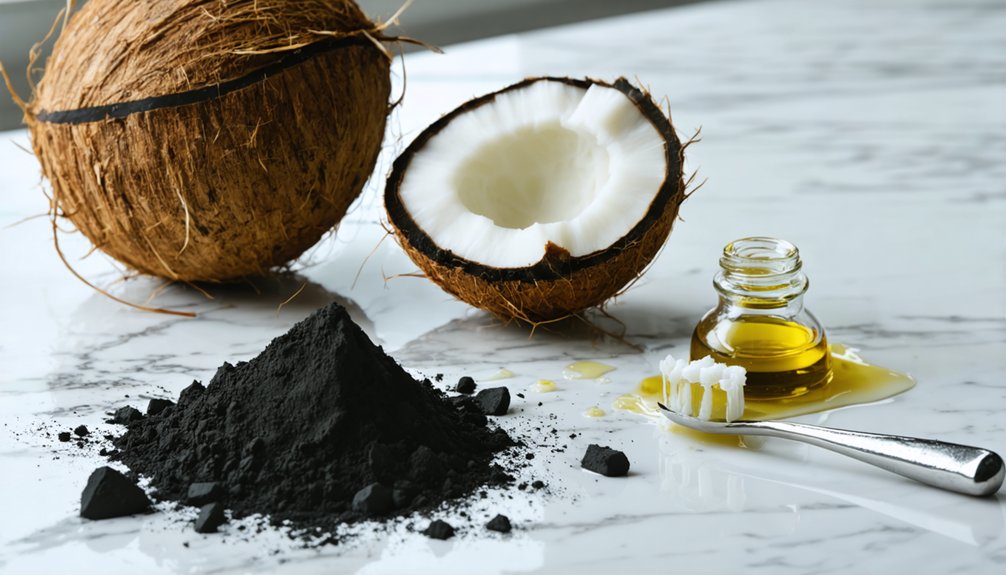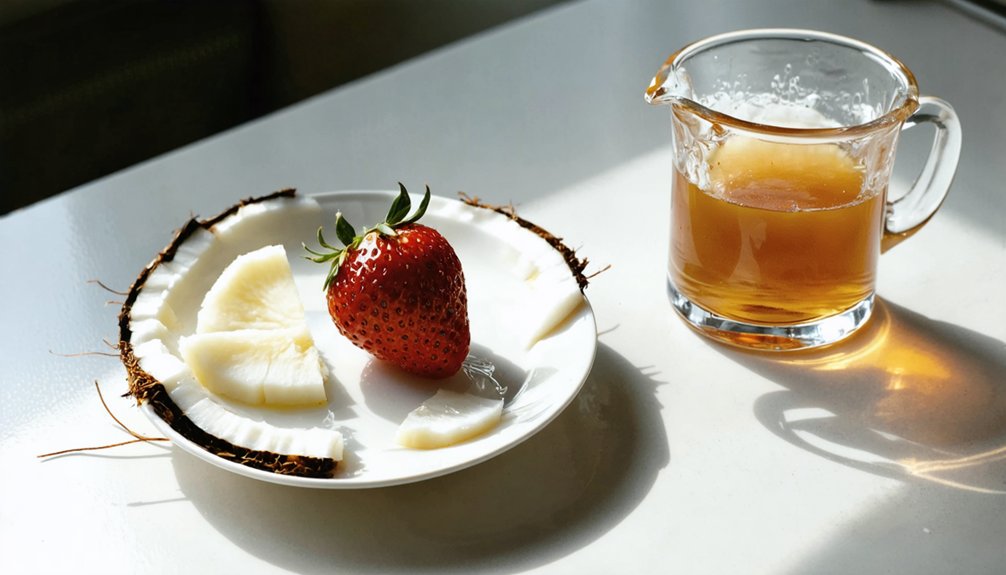For natural teeth whitening, enzymatic gels containing bromelain offer you the most scientifically-proven results. This pineapple-derived enzyme breaks down protein-based stains effectively while maintaining your tooth enamel’s integrity. Unlike harsh DIY methods that can damage teeth, bromelain-based gels work gently and provide antimicrobial benefits. You’ll find bromelain particularly effective for both surface and deep stains, with results comparable to traditional whitening treatments. Discover why dental professionals are increasingly recommending this natural alternative.
Key Takeaways
- Bromelain-based natural gels show effectiveness comparable to traditional whitening treatments while being gentle on tooth enamel.
- Baking soda gel formulations provide safe, mild whitening by removing surface stains without damaging tooth structure.
- Enzyme-based whitening gels containing papain and ficin effectively break down protein-based stains while maintaining natural pH balance.
- Coconut oil-based gels may offer mild whitening effects, though scientific evidence is limited compared to professional treatments.
- Natural whitening gels combining turmeric and coconut oil provide gentle stain removal, but results take longer than chemical alternatives.
Understanding Natural Teeth Whitening Gels
While many people seek natural alternatives to chemical teeth whiteners, it’s important to understand what natural whitening gels actually are and how they work. These products use organic ingredients like baking soda, coconut oil, and turmeric to brighten your smile. Hydrogen peroxide found in professional whitening treatments penetrates enamel more effectively than natural alternatives.
However, user experiences have shown mixed results, with some reporting minor improvements while others see no change at all.
When evaluating ingredient effectiveness, you’ll find that natural whitening gels typically don’t match the results of professional treatments. While they may help remove surface stains, scientific evidence supporting their whitening capabilities remains limited.
You should also be aware that some natural ingredients can be abrasive, potentially damaging your tooth enamel with excessive use. Consulting a healthcare provider is essential before starting any whitening regimen to ensure it’s safe for your teeth.
The Science Behind Enzymatic Whitening
As scientists explore alternatives to traditional teeth whitening methods, enzymatic whitening has emerged as a promising approach that harnesses natural proteins for stain removal.
You’ll find that enzymes like papain, bromelain, and ficin work by breaking down specific proteins that cause discoloration, offering a gentler alternative to peroxide-based treatments.
These enzymes’ bleaching potential relies heavily on proper storage conditions and enzyme stability. The enzymes target both external and internal stains while maintaining the tooth’s delicate pH balance.
To achieve optimal whitening results, enzyme-based treatments must be stored correctly, as their effectiveness depends on maintaining protein structure integrity.
Studies show these natural enzymes produce similar whitening results to carbamide peroxide treatments.
When you’re considering enzymatic whitening products, you should know they target stain molecules with remarkable precision, potentially reducing the risk of enamel damage.
While they may require more time to achieve desired results compared to peroxide treatments, they’re particularly beneficial if you’re looking for a more natural approach to teeth whitening.
Current research continues to optimize these enzymes for improved effectiveness in commercial applications.
Bromelain: A Promising Natural Alternative
Recent clinical studies have established bromelain as a powerful natural alternative for teeth whitening, demonstrating efficacy comparable to traditional carbamide peroxide treatments.
You’ll find that bromelain benefits extend beyond simple whitening – it breaks down stain molecules through gentle enzymatic action without damaging your enamel structure.
Unlike hydrogen peroxide products that can cause sensitivity, bromelain’s proteolytic properties safely remove surface stains while providing anti-inflammatory and antimicrobial advantages.
The enzyme specifically targets proteinaceous stains from foods and beverages, increasing tooth reflectivity without harsh chemical oxidation.
Research confirms bromelain’s excellent safety profile, showing no cytotoxicity to human fibroblasts and no negative effects on enamel integrity.
You can confidently recommend this natural whitening solution to patients seeking effective results without compromising their oral health.
Studies show that bromelain gels achieve similar color variation to carbamide peroxide-based whiteners.
Safety Profile of Natural vs. Chemical Agents
Natural whitening agents typically demonstrate a more favorable safety profile compared to their chemical counterparts, though both categories require careful evaluation.
While gentler on teeth and gums, natural whitening agents still need thorough safety assessment before use in dental care.
When you’re assessing safety assessments, you’ll find that natural compounds like cysteine proteases show lower toxicity levels and reduced risk of chemical interactions with dental materials.
However, you must remain vigilant about proper application regardless of your chosen method. Both natural and chemical agents can cause gum irritation and enamel erosion if used incorrectly. Traditional whitening products containing peroxide-based agents have been extensively studied for their ability to break down stain-causing compounds. Professional dental supervision ensures the safest application of custom-made guards.
While chemical agents have standardized safety protocols through FDA and ADA guidelines, natural alternatives often lack this regulatory oversight.
You’ll want to take into account that while natural agents may pose fewer risks for sensitivity, their effectiveness isn’t as thoroughly documented as peroxide-based solutions.
Always consult your dentist before starting any whitening regimen.
Common Myths About Natural Whitening Methods
While you may have seen social media posts touting lemon juice and activated charcoal as natural teeth whiteners, these DIY methods can permanently damage your tooth enamel through erosion and abrasion.
Scientific evidence shows that natural solutions like charcoal, lemon juice, and fruit-based remedies offer minimal to no whitening benefits while potentially causing irreversible harm to your teeth. Regular oil pulling practices have not demonstrated scientifically proven whitening results, according to dental professionals.
Professional treatments achieve three to eight shades of whitening with proven safety. Instead of risking your dental health with unproven home treatments, you’ll achieve safer and more effective results through dentist-approved whitening methods that are specifically formulated to protect enamel while brightening your smile.
Lemon Juice Reality Check
Despite the widespread belief that lemon juice offers a safe, natural solution for teeth whitening, scientific evidence reveals significant risks that outweigh any potential benefits.
The visible whitening effect you’ll observe from lemon juice isn’t true bleaching – it’s actually permanent enamel erosion caused by the juice’s high acidity (pH ~2).
Don’t be misled by claims that mixing lemon juice with baking soda makes it safe. Home mixtures can’t reliably neutralize the acid, and the combination’s abrasiveness may cause additional damage.
Even commercial toothpastes containing lemon extract are specifically formulated to minimize acid exposure.
The reality is that any whitening you achieve through lemon juice comes at the cost of irreversible enamel damage, increased sensitivity, and higher cavity risk. While a study showed significant whitening effects after four weeks of lemon juice use, the damage to tooth structure makes this method dangerous and inadvisable.
DIY Vs Science-Based Solutions
Many DIY teeth whitening methods circulating on social media promise dramatic results without scientific backing. While natural ingredients may seem appealing, they often lack the proven whitening effectiveness of professional treatments.
You’ll find that DIY solutions using baking soda, turmeric, or strawberries aren’t supported by scientific evidence and could actually harm your teeth’s enamel.
Professional whitening methods, in contrast, offer predictable results through carefully tested formulations. They’re specifically designed to minimize risks while maximizing results, and can be customized to your specific needs.
When advising others about teeth whitening options, it’s essential to emphasize that “natural” doesn’t always mean safe. Rather than experimenting with unproven DIY methods, direct people toward science-based solutions that protect their oral health while achieving the desired whitening results.
Charcoal’s Limited Whitening Power
Activated charcoal’s reputation as a natural teeth whitener has spread widely on social media, yet scientific evidence reveals significant limitations in its effectiveness.
When comparing charcoal efficacy to proven whitening methods like peroxide-based treatments, studies consistently show inferior results. The primary whitening mechanism relies on abrasion rather than chemical whitening.
Charcoal abrasiveness concerns are significant, as these products can damage your tooth enamel over time. You’ll risk developing tooth sensitivity, gum recession, and potential long-term complications.
More worryingly, charcoal particles may become embedded in dental work and enamel cracks, causing unsightly dark lines. Instead of achieving the bright smile you’re seeking, you might face dental complications that affect both your oral health and appearance.
For safe whitening results, consider professionally supervised peroxide-based treatments.
Professional Perspectives on Natural Solutions

While natural teeth whitening solutions have gained popularity among consumers seeking chemical-free alternatives, dental professionals consistently express concerns about their safety and efficacy.
When evaluating natural agents like baking soda, activated charcoal, or apple cider vinegar, dentists find their whitening effects are often minimal compared to professional treatments.
Professional recommendations strongly caution against using highly acidic or abrasive natural substances that can permanently damage your tooth enamel.
If you’re considering natural whitening options for your patients or clients, it’s essential to understand that professional treatments offer more predictable results and better safety profiles.
They’re specifically formulated to protect enamel while effectively removing both surface and deep stains, making them a more reliable choice for achieving lasting results.
Making Informed Choices for Tooth Whitening
To make informed decisions about tooth whitening, you’ll need to understand both the benefits and limitations of natural alternatives compared to professional treatments.
While natural ingredient sources can offer gentler whitening solutions, they primarily address surface stains rather than deep discoloration.
When considering teeth whitening ethics, it’s important to prioritize your patients’ long-term oral health over quick results.
Baking soda mixed with water provides a safe, mild option for surface stain removal, but avoid recommending acidic substances like lemon juice or vinegar that can permanently damage enamel.
Instead, guide patients toward ADA-approved products or professional treatments for significant whitening needs.
Remember that natural whitening methods require consistent monitoring to prevent overuse, and they work best when combined with regular professional dental care.
Frequently Asked Questions
How Long Does It Take to See Results From Natural Whitening Gels?
You’ll see a slower results timeline with natural ingredients, typically requiring 3-4 weeks of consistent use before noticing subtle changes, and you’ll need frequent applications to maintain effects.
Can Natural Whitening Gels Remove Deep Tobacco or Coffee Stains?
Rome wasn’t built in a day, and natural gels aren’t your best bet for deep tobacco stains or coffee stains. You’ll need professional peroxide-based treatments for significant removal of these stubborn discolorations.
Should Natural Whitening Gels Be Used Before or After Brushing Teeth?
You’ll want to brush first, as application methods for natural whitening gels work best on clean teeth. Follow proper whitening frequency guidelines and avoid brushing immediately after acidic treatments.
Do Natural Whitening Gels Work on Dental Crowns and Veneers?
Like trying to bleach a ceramic tile, natural whitening gels won’t change your dental crowns or veneers. These dental materials lack organic components needed for whitening effectiveness, remaining their original shade permanently.
Can Pregnant Women Safely Use Enzyme-Based Natural Whitening Gels?
You shouldn’t use enzyme-based whitening gels during pregnancy due to limited safety data. While they’re gentler than peroxide products, their pregnancy safety and enzyme effectiveness haven’t been conclusively proven.
References
- https://pmc.ncbi.nlm.nih.gov/articles/PMC9915942/
- https://pmc.ncbi.nlm.nih.gov/articles/PMC10024105/
- https://www.nature.com/articles/s41598-020-66733-z
- https://www.ada.org/resources/ada-library/oral-health-topics/whitening
- https://www.urmc.rochester.edu/news/publications/health-matters/diy-teeth-whitening-too-good-to-be-true
- https://www.todaysrdh.com/study-shows-natural-tooth-whiteners-as-effective-as-peroxide-whiteners/
- https://www.frontiersin.org/journals/dental-medicine/articles/10.3389/fdmed.2021.687507/full
- https://healthcare.utah.edu/the-scope/health-library/all/2023/10/does-home-teeth-whitening-really-work
- https://pmc.ncbi.nlm.nih.gov/articles/PMC4058574/
- https://health.clevelandclinic.org/is-teeth-whitening-safe



